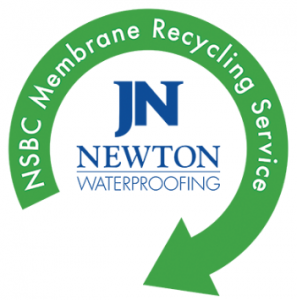
ASUC member company Newton Waterproofing Systems has a scheme that sets it apart. The Membrane Recycling Service is a great example of innovation within the waterproofing industry. It is the first and only such scheme of its kind, collecting and recycling plastic waste from waterproofing installations. As a result, the service was nominated for the ASUC Special Achievement Award 2018.
The industry is faced with an inherent problem: what to do with the hundreds of tonnes of HDPE that are sent to landfill every year? Following a two-year research and development process, the Newton Membrane Recycling Service provides a solution to this.
The closed-loop process collects waste off-cuts of HDPE membrane from Newton’s nationwide network of Specialist Basement Contractors (NSBCs) on delivery backloads, therefore avoiding additional emissions and removing the need for extra vehicle journeys. The collected membrane is then processed at Newton’s Kent headquarters before being sent for recycling into new construction products.
Research and Development
During the research and development proves of this service, Newton Waterproofing had to overcome serious challenges. In order to keep carbon emissions at a minimum, it was necessary to develop the scheme around their dozens of active sites across the UK. It was also important to keep the service traceable, so that it would be possible to track the production of all waste materials.
As a result of these efforts, Newton is now able to produce frequent reports for participating companies on how much they are recycling and the subsequent environmental savings.
Over the course of 2018, the Recycling Service went from strength to strength and recycled 5.275 tonnes of HDPE during the calendar year.
The service has now recycled a grand total of 8.53 tonnes of HDPE since it began, which can be converted into several other measurements that help to quantify the amount.
By recycling this quantity, for instance, Newton have avoided the release of 9.8 tonnes of Carbon Dioxide equivalent (CO2e) into the atmosphere. To create the same quantity of emissions from fuel would require 4,461 litres (3.13 metric tonnes) of petrol. Both of these quantities can be equated to the generation of 38,306 Kilowatt Hours (kWh) of energy, or 1,362,018 cups of tea!
With this level of data and analysis available, Newton are able to provide participating NSBCs, architects and main contractors with a detailed breakdown of the environmental benefits of their recycling contributions.
Throughout the development of the service Newton broke new ground, researching new possibilities, forging new relationships with re-processors and recycling organisations, and committing significant amounts of time, energy and resources to a ground-breaking new innovation, at no extra cost to their clients, contractors or the end customer. It is this level of innovation and results-driven processes that sets ASUC members apart.




